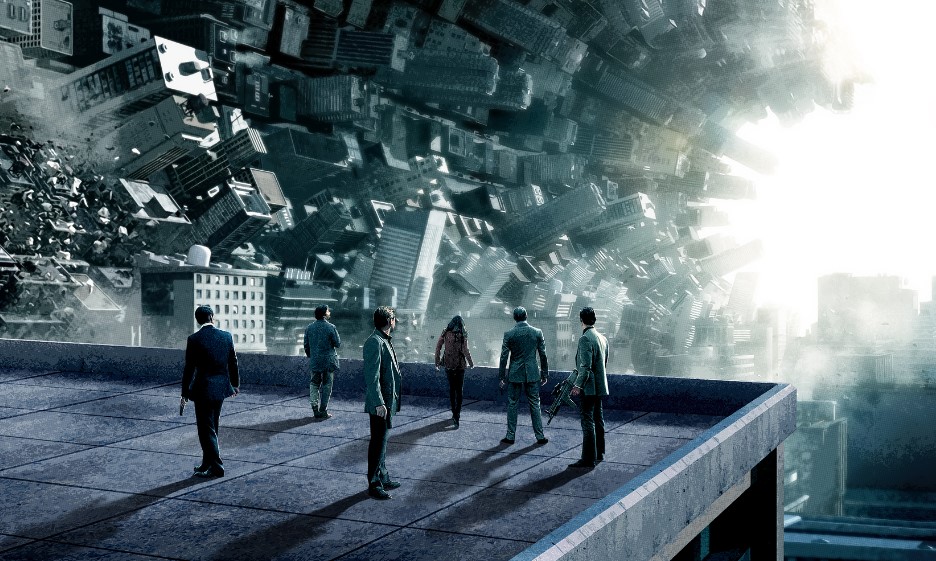
Inception is the best movie of this summer, perhaps even the past few summers and Chris Nolan is making what Dane Cook would refer to as “cinematic adventures” fun, surprising and satisfying once again. Despite Nolan’s ever increasing reputation as a sure thing, I had numerous reservations about this production as soon as the advertising campaign began. The first red flag had to be the timing of the campaign which was attached to pre-trailer screenings in theatres about 4 to 5 weeks ago. Beginning with the hype so early has seen many a film before this crumble under the weight of its own perceived potential. The second had to be the often maligned and coveted PG-13 rating which has usually signified the blunting of supposedly “edgy” material in order to capture the younger teen audience and the dollars they represent. The third had to be the inclusion of Ellen Page in this type of psychological thriller. Her iconic role as the title character in Juno (2007) gave her great exposure and professional success, but it also cemented her as a talented coming-of-age-romantic-comedy thespian. The casting of Page in a psychological thriller seemed as awkward as the casting of Winona Ryder in Alien: Resurrection (1997). Regardless of all these concerns Nolan pulls together a strong performance of the entire cast and an exceptional application of various special effects with the epic nature of a plot that ventures into the depths of the human mind. Those of you who seldom find an interest or opportunity to hit the cinemas are doing yourselves a great disservice by not giving Inception a chance. This film is not just eye candy and makes your mind engage to appreciate. This film is not to be missed.
Developing a story that contrasts perceived reality with actual reality is not uncharted territory and I could see how filmic elitists would point immediately to The Matrix (1999) as a film that has covered this material in a superior fashion and Inception as a simple follow-up. I plainly disagree. Every story requires a driving force; a plot device that propels the audience through scenes that feature action, dialogue and exposition. The combination of combat choreography with a visual dynamic enhanced by digital effects happens to be said device for The Matrix. Inception, on the other hand, features surrealistic cinematography enhanced by practical effects to keep the audience involved. In addition, the plot structure of Inception is far more complicated and non-linear when compared to The Matrix. Chris Nolan’s story features parallel action in completely different worlds that directly impact each other. The simultaneous comprehension of these interlocked actions produces an effect far more laborious than casual “popcorn” appeal. Forcing the audience to think is never a bad thing, that is, unless a member of the audience is far too used to being spoon fed. Balancing what is revealed among the different dream worlds in a consistent pattern of building tension is evidence of Nolan’s literary prowess. Combined with a clear and uncompromising vision for the plot’s presentation, Inception deserves unique recognition. Certainly, Chris Nolan borrows from many films of the recent past in order to construct this story, but every successful director, writer or creator of fiction will tell you that the best material is always “stolen.”
I have never been a fan of Leonardo DiCaprio, especially since his involvement with Titanic in 1997 led teeming masses of adolescent girls to transform a pedestrian story that everyone knows the ending to, into a pop cultural juggernaut. His performances in The Departed (2006) and Shutter Island (2010) have led me to respect the man’s abilities more and more and his depiction of Cobb in Inception continues that trend. Cobb is not a character whose physical prowess, moral fortitude or unique ability causes the audience to relate or even admire; quite the opposite in fact. Cobb is very much an anti-hero whose simple motivation to return home to be with his children extracts sympathy from the audience. DiCaprio’s character may be a “dream thief” but Chris Nolan gives him several scenes to establish sympathy with the audience and it is in DiCaprio’s sincerity and humility where he capitalizes on those opportunities. Leonardo is an excellent leading man whose well rounded ability is showcased in a film that requires the exploration of several emotional centers.
The rest of the cast fills out quite nicely as Nolan favorites Ken Watanabe, Michael Caine and Cillian Murphy produce solid supporting performances but are sadly underused. Ellen Page, though not called upon to engage in excessive fisticuffs or gunplay, does her role as Cobb’s psychological and moral center, justice. The contentious relationship between straight man Joseph Godon-Levitt (Arthur) and free spirit Tom Hardy (Eames) provides welcome moments of comedic breaks in the compounding tension of this psychological thriller. I was pleasantly surprised by the martial prowess displayed by both actors in their respective action sequences. When it comes to describing the performance of the main antagonist Mal, played by Marion Cotillard, the word surprising, comes to mind: surprising in what she delivered and surprising in that she did not go far enough. If a film’s big bad could ever be loveable, Cotillard accomplishes this in spades and she does owe this in large part to her overall sex appeal. As the film progresses, the audience bears witness to Cotillard’s impressive reservoir of raw emotion that unfortunately never gravitates away from dire sadness. I cannot help but wonder what her performance would have yielded if her character’s emotions shifted to vindictive hate. Then again, such an emotional shift would transform her character into something else entirely.
Three cheers for special effects supervisor Chris Corbould and his team for being able to meet Chris Nolan’s demands for featuring practical effects over digital ones. Practical effects always add a level of realism on film that even the most polished digital effects are just not capable of reproducing. No matter how expensive and difficult it is for a digital artist to render a completely false image or effect, doing the same thing practically (with wire work and actual actors, for instance) will always be MORE expensive and difficult. The hotel room/hallway scenes featuring Joseph Gordon-Levitt are the best examples of this practical effect gold. Having seen a sneak preview for Inception, I happen to know that the hotel sets were constructed with the specific purpose of showing an ever shifting change in and erasure of gravity. This would be no small feat even for a computer, but what is shown on screen is nothing less than pure fantasy ballet: poetry in motion. Of course, to exhibit the epic scale of the infinite possibilities of the human imagination, wider shots featuring the physically impossible (a city folding in on itself, for instance) are produced digitally and masterfully. The fact that these types of scenes are not used as a crutch allows the audience to suspend disbelief seamlessly. Inception is a Hollywood production of very high production value, but even I was surprised when I saw that this film’s budget was an incredible $200 million dollars. The money was well spent!
The summer of 2010 is not yet finished, but I can say without hesitation that Inception is the kind of blockbuster that the audience has been waiting for a long time. This is a thinking person’s film, so be prepared to engage the plot or remove yourself from the premises. The depths of the conscious and subconscious mind are fully realized thanks in no small part to the excellent collaboration amongst the production staff, art department and special effects. This film represents the triumph of many stemming from the vision of one. Hopefully Chris Nolan does not sour Inception by turning it into a sequel franchise based on a chilling reveal in the film’s denouement.







